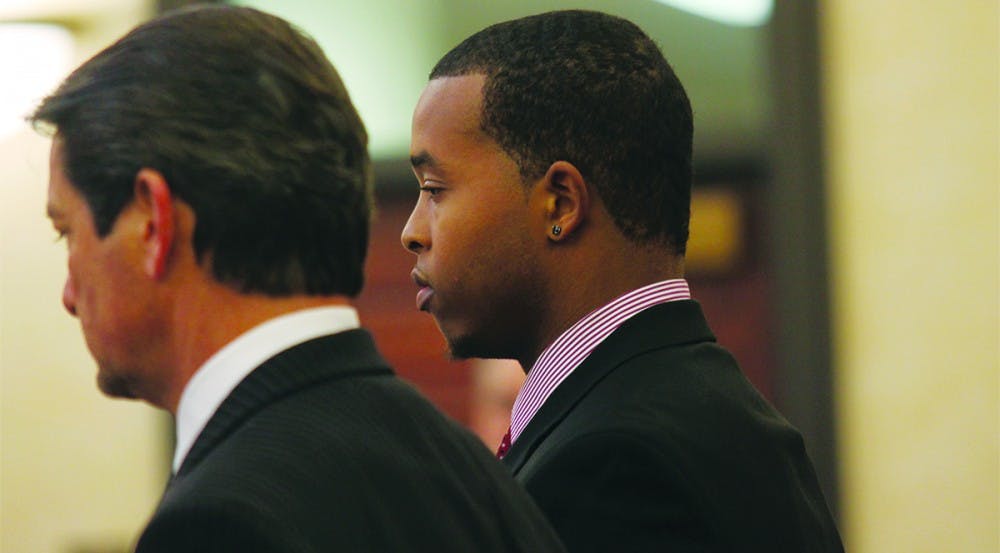Young said his client was “shocked” at the charges and didn’t expect to be indicted in the case, adding his client is exactly the type of person the statute should be protecting.
“My view of this so far is that (Johnson) is a picture of the person that this statute is designed to protect, not to prosecute,” Young said. “My view of this statute is it’s designed to protect any student athlete from the grips of an agent. Period.”
Johnson, who started all 11 games for N.C. Central in 2009 and six games in 2010, was friends with Little, and his attorney maintains that the two still have a relationship.
In a search warrant unsealed in September, Little told investigators Johnson took a Memorial Day trip with him to Florida in 2010. Airline tickets for that trip were paid for by Jennifer Wiley Thompson. She was reimbursed $1,159 for the airline tickets by Watson, according to the warrant.
Johnson has been employed by Rosenhaus Sports Representation — the agency that signed Little in 2011 — but his biography has been taken down from the agency’s website.
Barley, who is employed by Watson Sports Agency, is charged with providing $1,525.74 in benefits connected to a 2010 Memorial Day weekend trip to Miami taken by former UNC defensive end Robert Quinn.
Indictments stated that Barley provided a car for two days, $100 in cash, a Miami hotel room valued at $675.74 and $750 for two round-trip airline tickets from North Carolina to Florida for Quinn
around May 28, 2010.
A search warrant unsealed in September stated that a man referred to as “Willie” met former defensive tackle Marvin Austin in Florida and assisted Watson in delivering money to Austin.
The search warrant also stated that Austin said “Willie” put him in touch with Watson. Barley was not indicted in connection to any interactions with Austin.
Barley and Johnson are the fourth and fifth people respectively indicted on charges of athlete-agent inducement stemming from the North Carolina football scandal. Each person indicted was associated with Watson.
All five defendants are expected to appear in Superior Court on Dec. 17.
Former UNC tutor Jennifer Wiley Thompson was the first to be charged under the North Carolina Uniform Athletes Agent act on Oct. 3.
To get the day's news and headlines in your inbox each morning, sign up for our email newsletters.
She was charged with four counts of athlete-agent inducement. The unsealing of the final two indictments comes a month after Georgia real estate agent Patrick Mitchell Jones was indicted on one count of athlete-agent inducement.
Jones’ indictment stated he gave a woman, Constance Orr, $725 to give to Quinn.
Orr hasn’t been charged with any involvement in the case.
“I don’t know who (Constance) Orr … I don’t care if she’s a UNC softball player, I don’t know if she’s a UNC softball player,” Woodall said. “You’ve told me that, but that’s all I know.”
When asked why Orr wasn’t indicted, Woodall said that the investigation yielded more than was stated in the unsealed documents.
“I think you’re basing this on search warrants and indictments and we’ve got a lot more than that,” he said. “We’ve got tens of thousands of documents more than that. I’ll just say we’ve been looking at a lot more evidence than just search warrants.”
Athlete-agent inducement is a Class I felony that carries a maximum sentence of 15 months in prison per charge.
But Woodall has said in order to invoke the maximum sentence, a defendant must have a prior record.
Without that criminal record, a person can only receive probation if convicted.
The charges levied against the five involved likely won’t carry stiff punishment, but Woodall said investigators are pursuing the case, regardless of the weight of the penalty.
“You can’t look at the what the punishment may be to decide if you investigate and prosecute a crime, because if you did that, there’d be a lot of crimes that never got investigated or prosecuted,” he said.
“I don’t spend a lot of time worrying about what the punishment is. That’s not my job.
“My job is to prosecute if they bring me sufficient evidence. I think the secretary of state’s office brought sufficient evidence and that’s why we’re prosecuting.”
sports@dailytarheel.com



